GNU Project -
Software
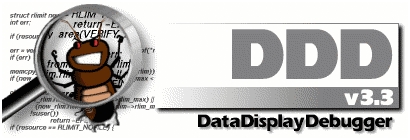
|
|
-
(2005/10/16) The DDD mailing list is now for subscribers only
.
Since I took over from Andreas as the maintainer of DDD,
I've been trying to get admin access to the mailing list
server web interface, in order to make the list a subscriber-only
list. In other words, only those subscribed to the list
can post messages to it.
I'm pleased to say that I've finally got help from the
system admins at gnu.org, who have granted me access.
So from now on, the DDD list will be a closed list.
Anyone who wishes to discuss DDD is welcome to subscribe.
Anyone who is a subscriber can post with no restrictions.
I regret that this can't be an open list any more, but
this is the spam-strewn world in which we live.
-
(2005/03/16) DDD 3.3.11 is now available.
DDD-3.3.11 fixes a problem introduced in 3.3.10 which affected DBX
users. It also features a fix that helps when using I18N encondings.
-
(2004/10/20) DDD 3.3.10 is now available.
DDD-3.3.10 features many, many improvements to perl-5.8.x support.
It also provides fixes for Sun's SunONE Studio dbx, as well as some fixes
for MacOS X.
-
(2004/06/24) DDD 3.3.9 is now available.
DDD-3.3.9 brings support for PHP; this is largely untested, so
feedback is most welcome. Locating source files when using dbx now works
automatically. The perl version supported by DDD is now 5.8.x; unfortunately
there remain a few wrinkles, but we're working on them. The debugger settings
window now starts at a larger, more reasonable size, and allows the user to
resize it. Several minor bugs have been fixed, memory leaks plugged, code
cleaned up, etc. And lastly, builds on many platforms have been improved, both
with G++ 3.x and with various vendor compilers. If you've had problems
building DDD on your platform (HPUX, Cygwin, Tru64, Solaris, Irix, AIX), then
this is the DDD version that's for you!
-
(2003/11/10) DDD 3.3.8 is now available.
DDD 3.3.8 contains some important memory corruption fixes, and better
interoperation with gdb-5.x, gdb-6.0, and the Perl debugger. In addition,
Arnaud Desitter has made literally hundreds of micro-optimisations throughout
the codebase. Builds on HPUX-10.20 and NetBSD are improved too. The manual is
now distributed in PS, PDF, and texinfo sources in the main distribution
tarball (previously, it was a separate bundle). DDD 3.3.8 is the fastest and
most stable DDD yet -- I strongly recommend upgrading if you are using an
earlier version.
-
(2003/07/31) DDD 3.3.7 is now available.
DDD 3.3.7 brings debugging of bash scripts (together with bashdb) and
improved conformity with ISO C++: in particular, G++-3.x is now the compiler
recommended for DDD. G++-2.x versions will definitely not work, and will no
longer be supported.
-
(2003/05/15) Andreas Zeller has handed maintainership of DDD to Andrew
Gaylard.
GNU DDD is a graphical front-end for command-line debuggers such as GDB, DBX, WDB, Ladebug, JDB, XDB,
the Perl debugger, the bash debugger, or the Python debugger. Besides
``usual'' front-end features such as viewing source texts, DDD has become
famous through its interactive graphical data display, where data structures
are displayed as graphs.
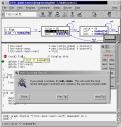
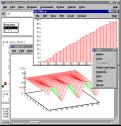
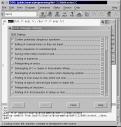
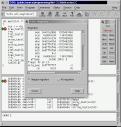
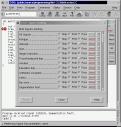
For more information (and more screenshots), see the
DDD Manual.
DDD can be found at
/gnu/ddd/ on
ftp.gnu.org.
DDD can also be found at
SourceForge.
You can also download GNU DDD from
any GNU FTP server near you or
buy copies on CD-ROM from the
FSF.
The ddd/ directory contains the DDD source distribution:
- ddd-version.tar.gz
-- this package is the one you want. It includes
-
- the complete DDD source code,
- building instructions, as well as
- the DDD manual in TeXinfo, Info, PostScript, and PDF formats.
Here are further instructions on how to download and
unpack GNU packages.
The FSF does not distribute DDD binaries. You can ask for help if you
need technical support.
DDD binaries for GNU/Linux are
typically available via your GNU/Linux distributor:
The written word provides
binaries of freely available software for various platforms. Their FTP
server contains DDD and XPM packages.
To build DDD from sources, you need
The simplest way to build DDD is:
- Unpack the DDD source distribution
- Change into the ddd-version subdirectory
- Type ./configure; make
To run DDD, you need the GNU debugger
(GDB), version 4.16 or later (or another command-line debugger
such as DBX, WDB, Ladebug, JDB, XDB, the Perl debugger, or the Python
debugger).
The DDD Manual contains a detailed tutorial.
Here are some free third-party tutorials on the Web:
Recent (not necessarily tested) snapshots of GNU DDD can be
found at http://sourceforge.net/projects/ddd/.
The DDD CVS repository (containing all versions of DDD, including the
very latest changes) is available via
http://sourceforge.net/projects/ddd/.
You can report bugs to bug-ddd at gnu.org. Before you
do this, please check the following:
- Please read the section ``Bugs and How to Report Them'' toward
the end of the DDD Manual.
- Be sure to include a copy of your ~/.ddd/log file
which tells your DDD configuration as well as the interaction between
DDD and the underlying command-line debugger.
The purpose of reporting a bug is to enable the bug to be fixed for
the sake of the whole community of users. You may or may not receive a
response; the maintainers will send one if that helps them find or
verify a fix. Most GNU maintainers are volunteers and all are
overworked; they don't have time to help individuals and still fix the
bugs and make the improvements that everyone wants. If you want help
for yourself in particular, you may have to hire someone for technical support.
If you are willing to help fixing DDD bugs, you can
subscribe
to the bug-ddd mailing list or access its archives.
We have a general-purpose mailing list devoted to DDD. You can ask
any questions to ddd at gnu.org. Patches and new
releases are also announced here. Subscription info and
mailing list archives are available. Owing to abuse by spammers,
it is necessary to subscribe before posting to the list.
If you need technical support on DDD, you can ask for technical support.
Here's a couple of related resources:
- GDB Home Page.
Includes latest patches and development snapshots.
- LessTif.
The free Motif clone.
- GVD.
The GNU Visual Debugger.
- HP Wildebeest (WDB).
A port of GDB to PA-RISC/HP-UX, by HP.
- Insight.
A very nice GUI for GDB from
Redhat, the GDB maintainers.
- KDbg.
A KDE-based GDB Interface with inspection of variable values in a tree structure.
- xxgdb.
The oldest and simplest X interface for GDB and DBX.
- tgdb.
A Tcl/Tk GDB interface (similar to Turbo Debugger or
CodeView).
- deet.
A simple and extensible graphical debugger.
- A list of available Perl debuggers.
The ultimate Perl reference.
- A GUI for the Perl Debugger.
Written in Perl.
- GNU Nana.
Improved support for assertions and logging in C and C++.
- GNU Checker.
A tool to find memory errors at runtime
- xwpe.
A programming environment integrating a program editor with an external debugger.
- Valgrind.
No-one developing C or C++ code under Linux/x86 or Linux/PPC should be without it.
Have fun with DDD!
Andreas Zeller
<zeller at gnu.org>
Andrew Gaylard <apg at users dot sf dot net>
Return to GNU's home page.
Please send FSF & GNU inquiries & questions to
gnu at gnu.org.
There are also other ways to contact the FSF.
Please send comments on these web pages to
webmasters at www.gnu.org,
send other questions to
gnu at gnu.org.
Copyright (C) 2000-2003 Free Software Foundation, Inc.,
59 Temple Place - Suite 330, Boston, MA 02111, USA
Verbatim copying and distribution of this entire article is
permitted in any medium, provided this notice is preserved.
Updated:
$Date: 2006/08/09 17:54:08 $ $Author: apgaylard $

